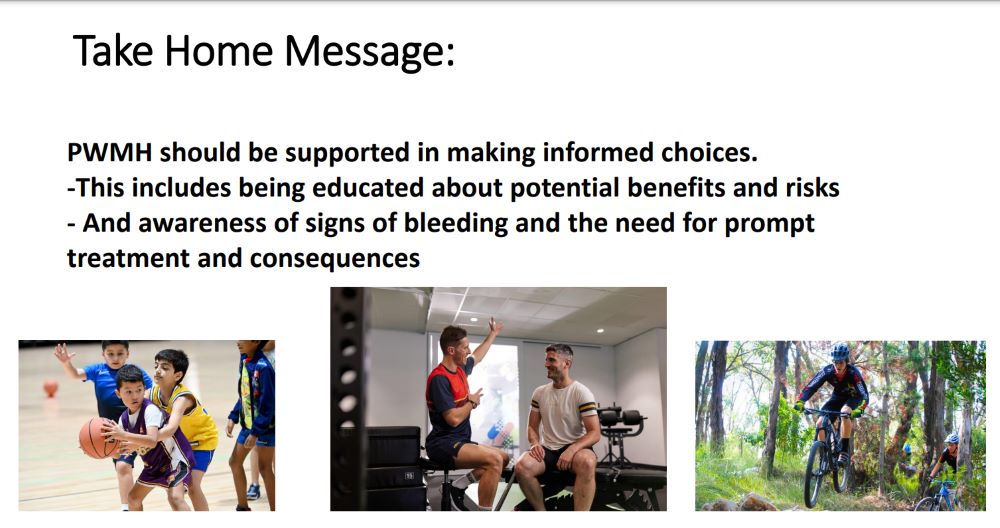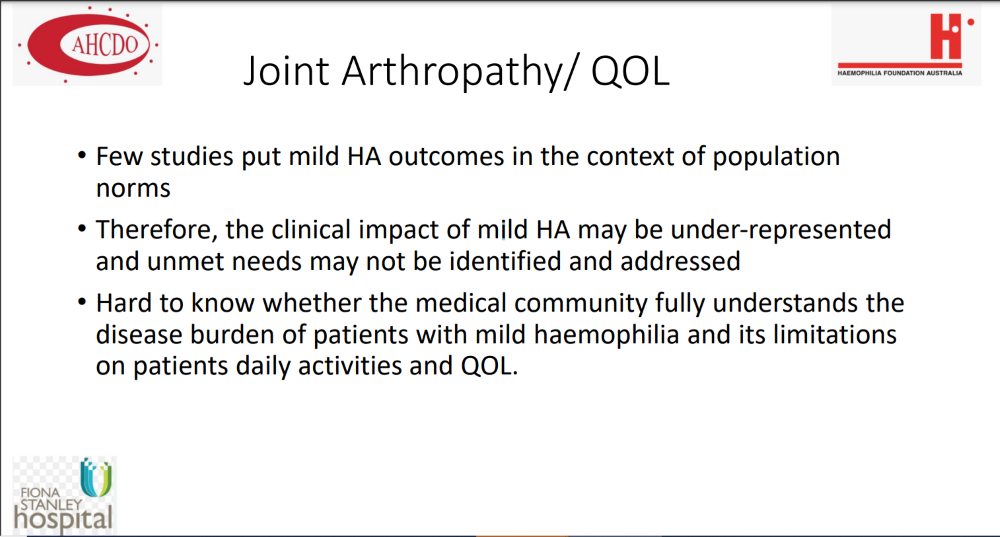Plenary – Managing mild haemophilia
Chair ~ Dr Heather Tapp
Personal perspective from a young adult and his dad ~ Louis and Tom
Diagnosis and treatment ~ Dr Heather Tapp
Mild haemophilia in adults: medical issues ~ Dr Stephanie P’ng
Nursing management, including surgery in mild haemophilia ~ Alex Klever
Physical activities and sport across the lifespan ~ Abi Polus
SUZANNE O’CALLAGHAN
Suzanne O’Callaghan is HFA Policy Research and Education Manager
Dr Heather Tapp introduced the session on managing mild haemophilia by describing it as ‘the new frontier’ and there was consensus among the speakers that there is still much to be understood.
If there is no family history, diagnosis can be delayed until there is unexpected bleeding following an injury or medical procedure and there is some concern internationally that mild haemophilia may be underdiagnosed.
Another issue reported commonly internationally is that people with mild haemophilia may not recognise bleeds or access assessment and treatment by their Haemophilia Treatment Centre (HTC) in a timely way. An outcome of this has been that a substantial number of males with mild haemophilia experience joint problems, even those who are younger adults.
Heather Tapp highlighted that providing education and support to people with mild haemophilia is becoming an increasingly important aspect of the work of HTCs. She drew attention to an example of an innovative injury self-management app (HIRT – Hemophilia Injury Recognition Tool) developed in Canada specifically for young men with mild haemophilia. The app assists them to identify the signs and symptoms of a bleed and then steps them through the process of assessment, with reminders to check the injury and contact their HTC when appropriate.
Although many people with mild haemophilia experience significant morbidity and consequences of unrecognised bleeds, she pointed out that mild haemophilia is not currently an indication for novel haemophilia therapies. She called for consideration to be given to access to the pipeline of novel therapies that may help normalise the lives of people with mild haemophilia. While gene therapy seems to be aiming to convert people with moderate or severe haemophilia to mild haemophilia, having mild haemophilia creates its own set of challenges. She concluded with a question for the future: ‘can we hope for a cure of mild haemophilia – the truly “haemophilia free mind”?’

NATALIE KARLOVIC
Natalie Karlovic is Physiotherapist – Oncology, Haemophilia and Palliative Care, Children’s Health, Queensland Hospital and Health Service
During the Managing mild haemophilia session, we heard from medical professionals, nursing staff, physiotherapists, and a patient perspective. A young adult and his father offered their experience with the condition.
Some of the more surprising evidence highlighted that people who have mild haemophilia often have worse physical impairments as they get older in comparison to their peers with moderate or severe.
Mild haemophilia also has a large spectrum of severity, with Dr Stephanie P’ng posing the question, ‘should we be classifying patients into severe-mild, moderate-mild and mild-mild?’.

Reflecting further on this, as gene therapy aims to transition patients from severe or moderate to mild, should physiotherapists play a larger role in the education aspect for this population to support them with identification and management of joint bleeds prior to permanent joint arthropathy?
Haemophilia Foundation Australia acknowledges the Traditional Owners and Custodians of Country throughout Australia, the land, waters and community where we walk, live, meet and work. We pay our respects to Elders past and present and extend that respect to all Aboriginal and Torres Strait Islander peoples.
Sign up for the latest news, events and our free National Haemophilia magazine